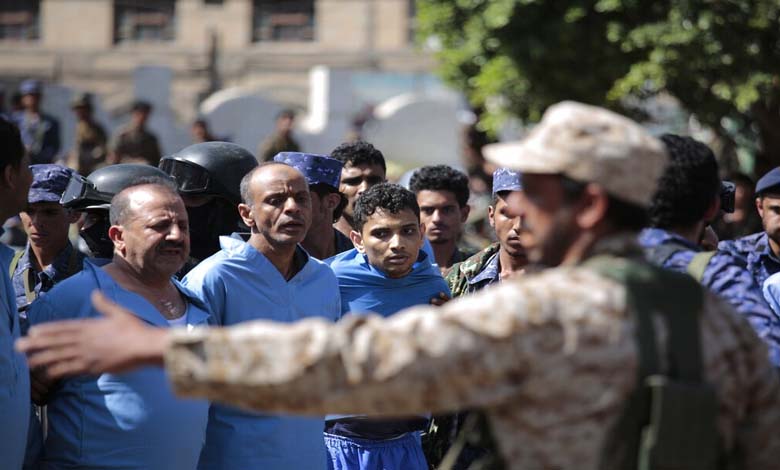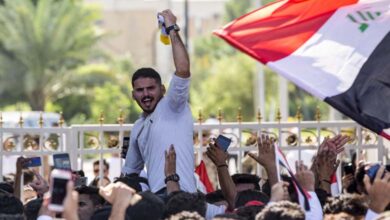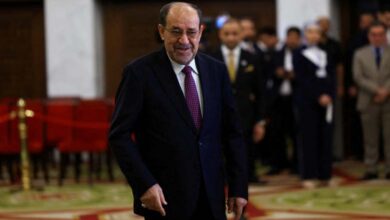Houthi death sentences aimed at restoring authority after intelligence failure

The Yemeni government accuses the Houthi court of relying on fabricated charges and coerced confessions obtained under torture and psychological and physical pressure.
The Yemeni government has accused the Houthis of issuing death and prison sentences against 17 Yemenis through what it described as “mock trials” lacking any legal basis. Media sources reported that these rulings come amid continued security breaches following major setbacks that have embarrassed Houthi authorities, who are seeking to restore their image among Yemenis.
-
Southern Yemen Moves Beyond the Conventional Framework: A New Diplomacy Confounds the Muslim Brotherhood and the Houthis
-
Houthis detain UN staff, including UNICEF representative
Minister of Information, Culture and Tourism Muammar Al-Eryani stated that the verdicts issued by the militia were based on “fabricated charges and manufactured confessions extracted through torture and psychological and physical pressure”, stressing that the process bears no relation to standards of justice.
He added in a post on the platform X that the Houthis’ broadcast of televised confessions while accelerating judicial sessions represents an attempt to present “illusory media victories” and to cover up the “security collapse” and infiltrations affecting the militia and its military apparatus.
-
The Deluge toll: 1,000 Houthis killed in 19 months
-
Between Denial and Confusion: Why Did the Houthis Delay Announcing Their Casualties?
The minister described these trials as a continuation of a “campaign of eliminations” conducted by the militia under the pretext of “espionage”, considering them a tool to suppress dissenting voices, eliminate opponents and impose an atmosphere of intimidation within society. He referred to the process as a “fully staged performance”.
The Houthi-affiliated Saba News Agency reported that the Specialized Criminal Court in the capital issued its ruling in “espionage cell cases linked to a joint intelligence network belonging to the United States, Israel and Saudi Arabia”, sentencing 17 Yemeni citizens, while two other defendants were given ten-year prison terms.
-
Houthis redeploy military communication networks in Hodeidah
-
Food for loyalty… how the Houthis turned their territories into a vast prison
According to the agency, the death sentences are to be carried out by firing squad in public as a deterrent. The defendants were accused of providing those countries with information that helped identify Houthi leaders and military targets. The trials lasted only about two weeks.
The prosecution had charged the defendants with “collaborating with foreign countries hostile to Yemen between 2024 and 2025, including Saudi Arabia, the United Kingdom and the United States, and spying for them through intelligence officers from those states and the Israeli Mossad, who allegedly supervised them, provided encrypted communication tools, geolocation applications and training on using concealed cameras connected to live-streaming programs”.
-
Houthis Claim Responsibility for Attack on Cargo Ship in the Gulf of Aden
-
Call for an international coalition against the Houthis: Experts stress collective action as essential for deterrence
According to the Houthi agency, the convicted individuals allegedly provided these adversaries with information about dozens of locations related to state officials, their movements, political, military and security details, as well as data on missiles and their launch and storage sites. They were also accused of recruiting citizens, installing surveillance cameras and receiving money in return, which allegedly contributed to the targeting of military, security and civilian sites, resulting in numerous casualties and extensive infrastructure damage.
These developments come amid significant turmoil within Houthi leadership following Israeli strikes in June and August, which exposed weaknesses in their security and intelligence system, causing what was described as a “major shock” within their structure.
-
Houthis Preempt September 26 Anniversary with Arbitrary Abductions in Sanaa and Ibb
-
The exposed collusion: when the Muslim Brotherhood and the Houthis unite against South Yemen
The Houthis have recently tightened security measures on residents, banned filming of targeted sites and threatened anyone doing so with accusations of “serving the enemy”. They have also carried out wide arrest campaigns in several areas and imposed restrictions including the prohibition of funerals or mourning ceremonies for their fighters except in remote regions far from media coverage.
In early November, the Houthi-controlled Ministry of Interior claimed it had dismantled a “spy network” linked to a joint operations room involving American, Israeli and Saudi intelligence services, allegedly based in Saudi Arabia. According to the statement, the network had established espionage cells inside Yemen, provided them with training and equipment, and contributed to supplying Washington and Tel Aviv with information about targeted sites.
-
Houthis Target Tel Aviv, Eilat and Beersheba with Missile and Three Drones
-
The Suffering of Yemenis: a moral fragility erasing lives under the domination of the Houthis and the Muslim Brotherhood
Minister Al-Eryani argued that this escalation reflects a systematic approach targeting employees of UN and humanitarian organizations, who are falsely accused of espionage as a means of pressuring them and controlling humanitarian work. He warned that continuing in this direction could pave the way for a new wave of executions and place detained UN staff among the first potential victims.
The minister called on the UN envoy to Yemen, the Office of the High Commissioner for Human Rights and relevant international organizations to take a clear stance on these “mock trials”, act immediately to stop the implementation of the sentences and secure the release of detainees.
The Houthi-controlled criminal court in Sanaa had already issued a death sentence by firing squad against 17 Yemenis, in addition to sentencing a man and a woman to ten years in prison, on charges of “espionage for foreign countries”, after expedited sessions lasting no more than two weeks.












